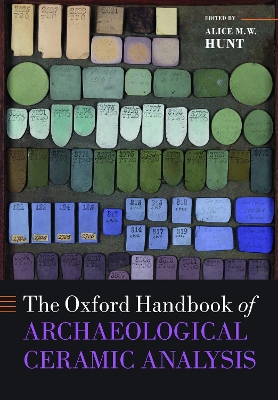Oxford Handbooks
1 total work
The Oxford Handbook of Archaeological Ceramic Analysis
Published 8 December 2016
The Oxford Handbook of Archaeological Ceramic Analysis draws together topics and methodologies essential for the socio-cultural, mineralogical, and geochemical analysis of archaeological ceramic. Ceramic is one of the most complex and ubiquitous archaeomaterials in the archaeological record: it occurs around the world and through time in almost every culture and context, from building materials and technological installations to utilitarian wares and votive
figurines. For more than 100 years, archaeologists have used ceramic analysis to answer complex questions about economy, subsistence, technological innovation, social organization, and dating.
The volume is structured around the themes 'Research design and data analysis', 'Foundational concepts', 'Evaluating ceramic provenance', 'Investigating ceramic manufacture', 'Assessing vessel function', and 'Dating ceramic assemblages'. It provides a common vocabulary and offers practical tools and guidelines for ceramic analysis using techniques and methodologies ranging from network analysis and typology to rehydroxylation dating and inductively coupled plasma mass spectrometry. Each chapter
provides the theoretical background and practical guidelines, such as cost and destructiveness of analysis, for each technique, as well as detailed case studies illustrating the application and interpretation of analytical data for answering anthropological questions.
figurines. For more than 100 years, archaeologists have used ceramic analysis to answer complex questions about economy, subsistence, technological innovation, social organization, and dating.
The volume is structured around the themes 'Research design and data analysis', 'Foundational concepts', 'Evaluating ceramic provenance', 'Investigating ceramic manufacture', 'Assessing vessel function', and 'Dating ceramic assemblages'. It provides a common vocabulary and offers practical tools and guidelines for ceramic analysis using techniques and methodologies ranging from network analysis and typology to rehydroxylation dating and inductively coupled plasma mass spectrometry. Each chapter
provides the theoretical background and practical guidelines, such as cost and destructiveness of analysis, for each technique, as well as detailed case studies illustrating the application and interpretation of analytical data for answering anthropological questions.
